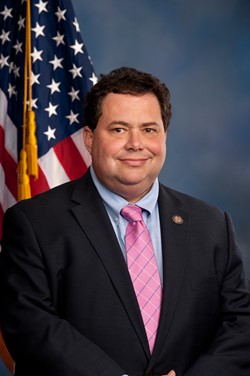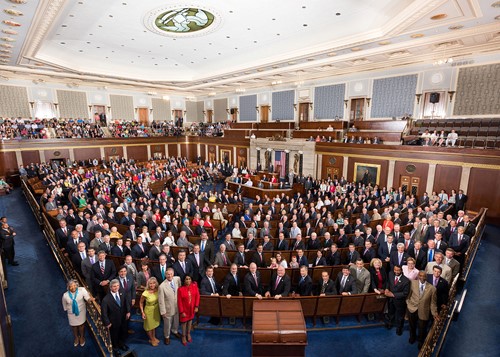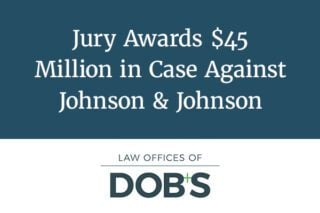On April 18, 2012, then-Congressman Ben Quayle introduced legislation that he said was necessary to root out fraud by people seeking compensation for asbestos-related diseases leaving more money for victims with genuine claims.
“I’m proud to introduce the FACT Act today,” Quayle, an Arizona Republican and the son of former vice president Dan Quayle, said at the time. “This legislation will provide sunshine and transparency to the asbestos trust system.”
In reality, the opposite was true and Quayle’s proposed bill went nowhere at the time.
Almost four years later, the U.S. House of Representatives is poised to vote on an updated version of the Furthering Asbestos Claim Transparency (FACT) Act when it returns from its holiday recess in early 2016. And Quayle, now a former congressman, is once again playing a key role.
That role: He is a now registered lobbyist for the Institute for Legal Reform, the U.S. Chamber of Commerce’s advocacy arm and one of the biggest supporters of the FACT Act.
Big Business and the FACT Act: A Cynical Ploy
Quayle’s transformation from one-term congressman to lobbyist for legislation he previously supported isn’t illegal or unusual in Washington, D.C. However, it illustrates how determined Big Business is to enact the FACT Act, which numerous critics say would make it significantly more difficult for asbestos victims and their families to file claims, likely delaying their receiving compensation.
“The so-called FACT Act is nothing short of a cynical ploy by the asbestos industry to get out of compensating those who are sick and dying from asbestos-triggered disease,” says Alex Formuzis, an executive vice president with the Environmental Working Group in Washington.
Formuzis, who wrote about Quayle’s role in a recent blog post at the Huffington Post, told Mesothelioma.com that the Chamber of Commerce’s decision to hire former congressman Quayle shows that industry is now “pulling out all the stops” to try to get Congress to pass the FACT Act.
“Quayle was one of the asbestos industry’s biggest apologists during his stint in Congress, having introduced the first version of the so-called FACT Act,” Formuzis says. “Now he’s on the payroll pushing his former colleagues to back the bill that would put veterans, firefighters and first responders, teachers and many others at greater risk of identity theft while delaying and denying compensation to those victims of asbestos disease.”
(Ben Quayle did not return calls seeking comment for this story.)
In addition to the Chamber of Commerce, the FACT Act is supported by the American Legislative Exchange Council and companies with billions of dollars of potential liability for asbestos claims, including Honeywell International and Koch Industries. A vote by the House of Representatives is likely to take place in January, when Congress comes back from its holiday recess. That vote is shaping up as a fierce battle, with asbestos victims and their families, veterans groups, consumer and environmental organizations, and labor unions vehemently opposed.
How the FACT Act Hurts Asbestos Victims
Among other things, the critics point out that the FACT Act will delay or deny compensation to asbestos victims and their families. It will also leave the victims vulnerable to identity theft by compelling asbestos bankruptcy trusts to disclose victims’ personal information, possibly including medical records and partial Social Security numbers.
Supporters of the FACT Act say it is needed to ensure transparency and root out fraud by making sure claimants aren’t able to “double dip” by claiming their injury twice, but critics say that claim is nonsense.
“The FACT Act has nothing to do with transparency,” says Pamela Gilbert, former executive director of the U.S. Consumer Product Safety Commission (CPSC) and now an attorney who represents asbestos victims and families. “The Bill violates the privacy of asbestos patients and family members, delays compensation, and provides legal advantages to companies that are defendants in asbestos lawsuits.”
She continues, “The FACT Act is opposed by asbestos victims, veterans’ groups, and privacy and consumer advocates. It is supported solely by companies that are defendants in asbestos lawsuits and for only one reason – to reduce their liability to the victims they poisoned with their asbestos.”
Linda Reinstein, president of the Asbestos Disease Awareness Organization and contributor to Mesothelioma.com’s blog, agrees. “The very industry that is responsible for the deaths of tens of thousands of Americans is behind this scheme to delay and deny justice to its current and future victims,” says Reinstein. “It’s a cynical ploy to escape even the smallest amount of responsibility for destroying the lives of innocent, hardworking people and their families.”
FACT Act Supporters Keep Trying
 This is the third time supporters have tried to get a similar bill passed in Congress. It was first introduced by then-Congressman Quayle in 2012, but failed to get anywhere. In 2013, a similar bill was introduced by Rep. Blake Farenthold, R-Texas, and passed the U.S. House of Representatives but failed to gain approval by the Senate. On Jan. 26, 2015, the current version was introduced in the U.S. House of Representatives, once again by Farenthold. The House Judiciary Committee approved the bill in May by a vote of 19-9, with all 19 Republicans voting for the bill. A similar bill has been introduced in the U.S. Senate by Sen. Jeff Flake, R-Arizona.
This is the third time supporters have tried to get a similar bill passed in Congress. It was first introduced by then-Congressman Quayle in 2012, but failed to get anywhere. In 2013, a similar bill was introduced by Rep. Blake Farenthold, R-Texas, and passed the U.S. House of Representatives but failed to gain approval by the Senate. On Jan. 26, 2015, the current version was introduced in the U.S. House of Representatives, once again by Farenthold. The House Judiciary Committee approved the bill in May by a vote of 19-9, with all 19 Republicans voting for the bill. A similar bill has been introduced in the U.S. Senate by Sen. Jeff Flake, R-Arizona.
As the U.S. House of Representatives head back to work after the holiday recess, House leaders will be combining the FACT Act with another pro-business piece of legislation, the Fairness in Class Action Litigation Act,” into a single bill. The combined bill will potentially be voted on as early as Wednesday or Thursday this week. Both the FACT Act and the class action act are considered to be so-called “tort reform,” bills that critics say would make it more difficult for victims to file claims and get compensated.
The FACT Act, critics say, would disproportionately harm veterans, firefighters, first-responders, and teachers, groups that have a higher incidence of mesothelioma than the general public. Veterans, for instance, represent only about 8 percent of the American population, but account for about 30 percent of mesothelioma victims.
Despite that, Farenthold has remained a staunch advocate of the FACT Act and claims he is working to help veterans. When the Judiciary Committee approved the bill in May, for example, he put out a statement claiming that the bill would help asbestos victims, including veterans.
“The passage of this bill will help stop the reduction in asbestos trust payouts – many of which have been reduced by more than 50 percent – that disproportionately hurts victims, especially our veterans who bravely put their lives on the line,” the statement said. “Every dollar taken through double-dipping or unscrupulous legal practices is a dollar less for those victims who face mesothelioma and other asbestos-related illnesses. The FACT Act will shine sunlight into the opaque asbestos trust system to fight this fraud and abuse.”

In an interview, Farenthold defends the FACT Act as being pro-asbestos victim and pro-veteran.
“What I want to reiterate is that this isn’t about cutting or lowering the amount victims receive or making it harder for victims to recover for their injuries,” Farenthold tells Mesothelioma.com. “What it is about is making sure that there is enough money left in the trust funds for future victims.”
He adds, “This applies especially to veterans because even though veterans make up only eight percent of the population, they make up 30 percent of asbestos victims.” Farenthold says he has received letters of support from numerous veterans’ groups, including the Texas Coalition of Veterans Organizations. “I see this as a pro-veterans bill,” he says.
Asked about claims by critics that the FACT Act would make asbestos victims vulnerable to identify fraud, Farenthold says “All we are asking for is the name of the person, the amount of the judgment and the basis of the claim.”
Over the years, Farenthold has touted his work on behalf of wounded veterans. In August 2013, for example, he announced that he had hired a member of the Congressional Wounded Warrior Program for an outreach program in his district. A year later, Farenthold and three other congressmen introduced legislation to support Wounded Warriors in the federal workforce.
But Jason Johns, Judge Advocate for the Military Order of the Purple Heart, a veterans’ organization made up of men and women who have received the Purple Heart while serving in the U.S. military, says Farenthold’s words are disingenuous.
“I think it’s hypocritical to say you are supporting Wounded Warriors when so many veterans are affected by asbestos exposure,” Johns said in an interview. “If [Congressman Farenthold] is truly concerned, why is he adding more burdens as a requirement? To say you are protecting veterans by introducing the FACT Act when actually adding more burdens on them doesn’t make sense.”
Lobbying for the FACT Act
Records show that Farenthold and other congressmen who have supported the FACT Act have received substantial campaign contributions from asbestos interests over the years. According to a study by the Environmental Working Group, the 19 House Judiciary Committee members who supported the FACT Act have received nearly $3.3 million in campaign contributions over the last five years from companies that would benefit from the bill’s passage.
The study said that those 19 congressmen received an average of $173,267 each from asbestos interests since 2010. The five congressmen who received the most were:
- Lamar Miller (R-Texas) – $382,150
- Darryl Issa (R-Ca.) – $372,329
- Virgil Goodlate (R-Va.), the Judiciary Committee chairman – $300,879
- Randy Forbes (R-Va.) – $286,285
- Blake Farenthold (R-Tex.) – $239,250
“Rep. Farenthold’s bill claims to be about increasing transparency for asbestos claims, but it’s really just a scheme to delay paying for victims’ deaths and illnesses as long as possible,” said Bill Walker of the Environmental Working Group, author of the report.
“The FACT Act would not only erect needless bureaucratic hurdles to victims’ compensation, but by forcing them to make public their personal financial data, could put them at risk of identity theft,” Walker said. “You might think such a bad bill would be a non-starter for members of Congress, but our report shows how asbestos interests are using their cash and clout in an attempt to deny justice and evade the consequences of their liability.”
In the interview, Farenthold says the contributions have nothing to do with his position on the FACT Act. “I have hundreds if not thousands of donors to my campaign,” he says. “Under current finance law, the most anyone can give is $2,700. Nobody is going to buy my vote for $2,700. That’s nonsense.”
Asked whether he had been lobbied by former congressman Ben Quayle, Farenthold says “Ben and I are friends,” but that the two men “have not had any detailed discussions” about the legislation. “I got an ‘Atta boy,’ from him” after introducing the FACT Act in 2013, Farenthold says of Quayle, but adds that “he hasn’t come into my office and lobbied me.”
Mounting Resistance Against the FACT Act
With a vote by the full U.S. House of Representatives looming, opponents of the FACT Act have been stepping up their efforts to convince members of Congress to defeat the FACT Act. In October, for example, three groups representing teachers, firefighters, and other first responders and public employees sent a letter to Congress opposing both the House and Senate versions of the FACT Act.
According to research, teachers, firefighters, and fire responders are also more likely to be diagnosed with asbestos disease than the general public, due to increase exposure to asbestos at work.
“Victims of asbestos exposure, including first responders and teachers, among many other dedicated public employees, are entitled to compensation from the companies that caused their illnesses,” the International Association of Firefighters (IAFF), National Education Association (NEA) and American Federation of State, County and Municipal Employees (AFSCME) wrote in the letter to Congress.
The letter said that both the House and Senate versions of the FACT ACT “would give companies an unfair advantage over asbestos victims seeking justice for their injuries — speciously touted as a ‘transparency bill,’ the measure actually is designed to help the asbestos industry avoid paying victims through delay tactics and waste of scarce trust resources set aside for victims. . . Our nation’s first responders, teachers and public employees dying of asbestos diseases deserve more respect and better treatment from Congress.”
Johns, the judge advocate for the Military Order of the Purple Heart, made a similar plea.
“We’re opposed to the Fact Act,” he says. “We feel the United States Congress should spend its time trying to make it easier for those injured by asbestos exposure to be compensated for their injuries – rather than continue to add more hurdles in order to appease the manufacturers of the product who knowingly exposed them.”




